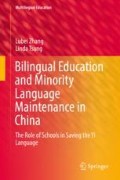Abstract
The display of language usually transmits symbolic messages as to the legitimacy, relevance, priority and standards of languages and the people they represent. The public space is a most relevant arena to serve as a mechanism for creating de facto language policy. In this chapter, the linguistic items present in Yi communities in Sichuan and Yunnan are examined. The focus is on selected Yi-Han bilingual schools and the areas around them, exploring how this underlying mechanism transmits the dominant language ideology and affects the actual language practice of the Yi youth. The analysis is divided into two parts, the first focuses on the linguistic items found in the schools, while the second looks at the linguistic landscapes in the wider areas outside the schools.
Access this chapter
Tax calculation will be finalised at checkout
Purchases are for personal use only
Notes
- 1.
Data from Report of Liangshan Prefecture national economy and social development 2010. http://newht.lsz.gov.cn/3/3xxgk.aspx?id=20110408170114-524592-00-000.
- 2.
Data from Liu, Zhong (2010) Thoughts on the minority language newspapers in south Sichuan (Dui Sichuan Xibu Shaoshu Minzu Wenzi Baozhi de Sikao). News World (10):60–61.
- 3.
Data from Kang, Hua (2010) Yi Publications by the Yi in Liangshan, China. Aboriginal education world 35: 70–73.
Bibliography
Ahniu, M., & Luobu, H. (2002). Ma yu Yizu Chuantong Wenhua [Horse and Traditional Yi Culture]. China Nature, 3, 39–40.
Cenoz, J., & Gorter, D. (2006). Linguistic landscape and minority languages. International Journal of Multilingualism, 3(1), 67–80.
Huebner, T. (2009). A framework for the linguistic analysis of linguistic landscapes. In E. Shohamy & D. Gorter (Eds.), Linguistic landscape: Expanding the scenery (pp. 70–87). London: Routledge.
Johnson, D. C. (2013). Language policy. New York: Palgrave Macmillan.
Krauss, M. (1998). The condition of native North American languages: The need for realistic assessment and action. International Journal of the Sociology of Language, 132, 9–21.
Reh, M. (2004). Multilingual writing: A reader-oriented typology: With examples from Lira municipality (Uganda). International Journal of the Sociology of Language, 170, 1–41.
Report on Liangshan Yi Autonomous Prefecture national economy and social development. (2010). Retrieved on Jan 6th 2014 from http://www.lsrb.cn/html/2011-04/10/content_15950.htm
Rowland, L. (2013). The pedagogical benefits of a linguistic landscape project in Japan. International Journal of Bilingual Education and Bilingualism, 16(4), 494–505.
Shohamy, E. (2006). Language policy: Hidden agendas and new approaches. London: Routledge.
Shohamy, E., & Waksman, S. (2009). Linguistic landscape as an ecological arena: Modalities, meaning, negotiation and education. In E. Shohamy & D. Gorter (Eds.), Linguistic landscape: Expanding the scenery (pp. 313–331). New York/London: Routledge.
Spolsky, B. (2008). Riding the Tiger. In N. H. Hornberger (Ed.), Can schools save indigenous languages? (pp. 152–160). New York: Palgrave Macmillan.
Author information
Authors and Affiliations
Rights and permissions
Copyright information
© 2019 Springer Nature Switzerland AG
About this chapter
Cite this chapter
Zhang, L., Tsung, L. (2019). Language Used in Public Spaces. In: Bilingual Education and Minority Language Maintenance in China. Multilingual Education, vol 31. Springer, Cham. https://doi.org/10.1007/978-3-030-03454-2_6
Download citation
DOI: https://doi.org/10.1007/978-3-030-03454-2_6
Published:
Publisher Name: Springer, Cham
Print ISBN: 978-3-030-03453-5
Online ISBN: 978-3-030-03454-2
eBook Packages: EducationEducation (R0)

